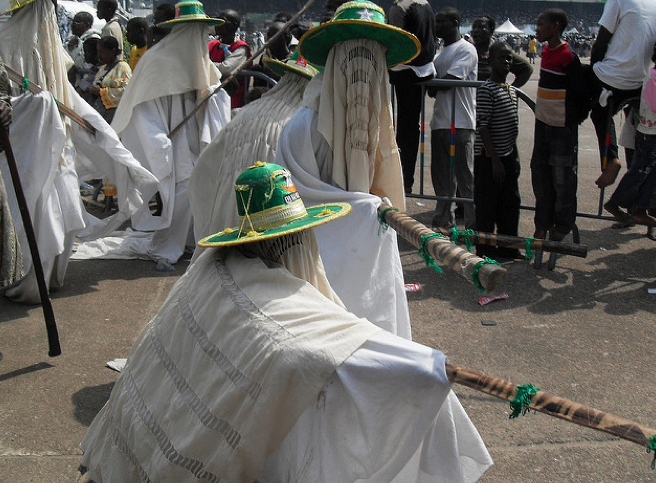The different cultural and ethnic groups that makeup Nigeria share a long history of distinct traditions, beliefs and practices that characterize them. This forms the background for its rich diversity and multiculturality. To this end, the Eyo Festival is one of these major practices, a monumental festival of masquerades, that takes place occasionally across the urban geographics of Lagos.
The Eyo Festival, also known as the Adamu Orisha play, originated in the 19th century. The first ceremony was held in Lagos, on the 20th of February 1854. It was initiated to commemorate the life of Oba Akitoye, a ruler who reigned twice as Oba of Lagos; first, from 1841 to 1845, and a second time, from 1851 to 1853. Akitoye’s life and reign were powerful, as he ruled during the systematic conquest of Great Britain. Also known for having allied with the British, he signed the Treaty between Great Britain and Lagos, abolishing the slave trade on January 1st, 1852. After he died in 1853, the next year saw the first existence of the Eyo Festival, commemorated in respect to his legacy; and it has gone on to become a tradition of the indigenous people of Lagos.
The Eyo Festival at its centre, is a display of dance performances by costumed dancers or masquerades. These masquerades are seen as spiritual representatives imbuing mystical importance. In the early days, as is determined by its origin, the festival was held to escort the soul of a departed king and to receive a new one. The masquerades are mostly dressed in white, larger-than-life clothes, agbada, that are both culturally aesthetic and spiritually relevant. They are seen as representatives of the dead, and the Yoruba call them “agogoro Eyo”, or tall masquerade.
The Eyo event is held at the urban heart of Lagos. On this day, the main highway, from the end of Carter Bridge to Tinubu Square, is closed to traffic, allowing for the procession of the masquerades. It is worthy to note that this festival does not have a fixed time, but rather is subject to spontaneity, as often determined by tradition and demand. However, it is usually preceded by the death of a highly regarded chief in the King’s court.
According to Pelu Awofeso, a cultural reporter and travel writer, it is the ‘senior’ Eyo group — the Adamu — that goes public with a staff, usually on a Sunday, signalling that the event will take place on the following Saturday. Throughout the full week before the festival, each of the four other Eyo groups— Laba (Red), Oniko (Yellow), Ologede (Green) and Agere (Purple)— take turns after the Adamu in that order, from Monday to Sunday.
To preserve the sacredness of this festival, as is part of the credo, some items are prohibited and the masquerades are known to punish the offenders of this rule. Some of these items include motorcycles, bicycles, sandals, and male caps of any kind, among many others. This rule is a visceral atrocity that is perceived as endangering the intuitive spiritual aegis of the festival. Some of the significant dates in which the Eyo Festival has been celebrated include:
- 2000, during the commemoration of Justice G.B.A. Coker, the Lagos High Chief, the Olori Adimu and the Olori Eyo of the Adimu Eyo cultural masquerade.
- 2011, on November 26, celebrating Prince Yesufu Abiodun Oniru, a well-respected Lagosian.
- 2017, on May 20; during the 5th anniversary of Lagos State and commemorating the influence of the late Oba of Ikale Kingdom, Oba Yekini Adeniyi Elegusi Kunsela.
The Eyo festival is rich and complex. Each Eyo group carries out their separate ritual procession, while also being closely knitted to the centralized purpose of spiritual sendforth. To a symbolic extent, the attire of the Eyo groups: the rich agbada and aropale, the akete and colourful charms, are all totems of the spirit world. As they perform on the modern streets of Lagos, men, women and enthusiastic children accompany them with singing and dancing, further enlivening the joyful yet dreadful phenomenon. The Eyo Festival reminds the people of Lagos and the whole of Nigeria of the beauty in their traditional heritage. It is one of the many culturally relevant practices in Nigeria today, promoting its diverse spirit rooted in history and belonging.
Reference sources:
https://en.wikipedia.org/wiki/Akitoye
https://sdgs.scout.org/post/showcasing-eyo-festival-western-nigeria-courtesy-scout-association-nigeria
https://www.gettyimages.com/photos/eyo-festival
Image credit:
@ba55ey
the234Project

